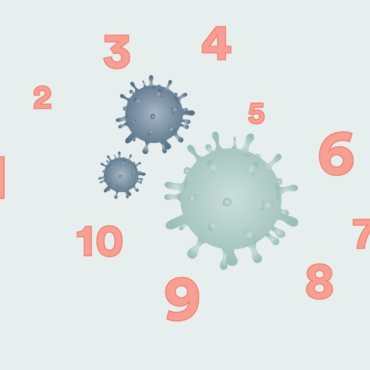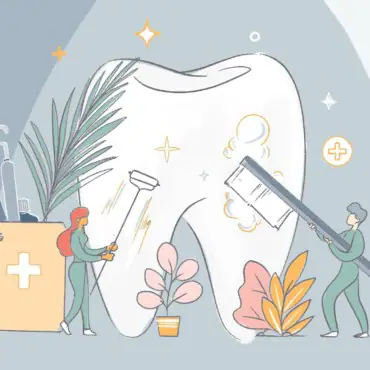If you’re considering getting a dental crown installed in your mouth, you should start by knowing your options, their implications for your oral health (and insurance!), and how much dental crowns cost.
Dental crowns are coverings, or caps, for ailing teeth. They’re typically used to refine the shape of a tooth, add support to a weak tooth, and conceal cosmetic issues like discoloration.
These days, crowns have become more common with advancements in dental technology. They’re certainly more similar in appearance to natural teeth than they used to be, with a variety of materials to choose from. Let’s explore.
Factors to consider when choosing dental crowns
Dental crowns may be classified according to their material, duration, and purpose. A variety of materials are available at different costs. Ultimately, of course, you should be working with your dentist to determine your specific needs and criteria.
Factors to consider include:
- The position of the affected tooth / teeth. For a molar tucked at the back, your dentist may recommend a metal crown. For those positioned more prominently, she or her may recommend ceramic or porcelain.
- The condition of the affected tooth / teeth. Your dentist will consider how much of the natural tooth will remain behind.
- The state of your gum tissue. With advanced gum recession, the part of the crown closer to the gumline will become more obvious. This may not look as nice if you’re considering a metal crown.
- Your peculiarities. These include your individual habits and even any allergies you have. For example, if you tend to chew hard materials or gnash your teeth, more durable materials will be more appropriate.
- Personal preference. Your concern for aesthetics will definitely influence decision making.
- And of course, your budget.
Types of dental crowns
Whichever type of crown you and your dentist decide is right for you, it will be designed and made to fit snugly over the remaining piece of your natural tooth. Different material options include the following:
Ceramic crowns
These are popular at the moment, with materials such as zirconia, porcelain, and others. Ceramic crowns do a very good job of mimicking the natural tooth. They have a warm, aesthetic appeal. However, they may crack and are generally not as durable as metal crowns.
Cost: $800 – $3,000
Porcelain fixed to metal (PFM) crowns
Just like their name, the upper, visible part of this option is made of porcelain, laid on top of a metal base. This option attempts to combine the best of both worlds (aesthetics and durability), though not always successfully. The metallic component may over time show up as a striking line above the gum. There is also a risk of metal allergy here too.
Cost: $500 – $1,500
Metal crowns
This option offers impressive strength and durability. However, metal crowns do stand out visually in contrast to the appearance of natural teeth. For this reason alone, they’re typically used to repair back teeth. Metal allergy may complicate their use also.
Cost: $600 – $2,600
Stainless steel crowns
This option, while not aesthetically the best, can work for a kid’s baby teeth, if a crown is required.
Cost: $120 – $350
Composite resin
These offer neither aesthetics nor strength of their porcelain counterparts. However, they are much kinder to your wallet.
- Provisional / temporary crowns. These may be constructed of different materials and are typically installed for a short time while you wait for a final or permanent crown to be made. In some cases, your dentist may deliberately leave a temporary crown in place for a long time. This is commonly done to reduce pain.
Cost: $300 – $700
How much do dental crowns cost?
On average, crowns will cost you between $800 and $1,700 per crown. Factors that come into play will include how badly your natural tooth is damaged, the type of material you select, and the level of skill required for the installation. (All-ceramic crowns require more skill and time.) The location of your dental practice may come into play also, as there are regional variations.
By material or type, costs of crowns will cost you the following:
- All-ceramic: $800 – $3,000
- Metal: $600 – $2,600
- Porcelain fixed to metal: $500 – $1,500
- Provisional stainless steel: $120 – $350
- Provisional resin: $300 – $700
What are the associated costs of getting a dental crown?
Getting a more perfect smile is not achieved in isolation. Your dental treatment will usually involve a range of procedures that may include the following:
- A full dental exam: $20 – $150
- Supplementary investigations such as X-rays, casting, or scans: $10 – $300
- A root canal: $300 – $2,000
Depending on the extent of damage, these procedures may cost more than the crown alone. Additionally, your crown may require re-visiting some years down the line. Factor this in, too.
Does insurance cover the cost of dental crowns?
Many dental procedures are considered cosmetic, meaning insurance companies typically don’t cover their cost. But while crowns may be considered cosmetic, they’re mostly correctional and restorative. They can relieve considerable discomfort and prevent further damage to the tooth or surrounding teeth. Also, they can be fit in a bid to prevent certain kinds of teeth damage. For these reasons, your insurance company may cover up to half of the dental crown cost.
Click here to see if you may be covered for dental insurance.
If you need assistance paying for your crown, you may consider other forms of payment. These may include a dental plan or liaising with a financial company to help you gradually offset the bills.
Book a dental consultation.
Find a dentist near you to tell you more about getting started on this procedure.
Why are dental crowns so expensive?
The pricey nature of dental crowns largely stems from their materials, some of which can be hard to source. And of course, getting a crown requires the time and skill of a dentist. And one visit may not suffice.
Are dental crowns worth it?
To answer this question, remember why you need a crown in the first place. Dental issues may cause self-esteem problems. You may lose productivity and end up spending much more to treat extensive damage. Prevention is cheaper than cure.
So although costly, dental crowns offer comfort and protection from further damage – as well as aesthetic appeal.
And maybe most importantly, remember that crowns are long-lasting treatments. They may serve you for a decade or even two. Depending on your age at the time of treatment, you may have your crown for the rest of your years.
So, yes, in the long run, we believe crowns are worth the price!
How long can a crown last?
Depending on their material, your oral hygiene approach, and your eating / chewing habits, crowns will typically last between five and 15 years. Some may take you through 20 years.
Naturally, metallic crowns last longer. They have a higher tensile strength and can withstand the force of chewing. Some patients love to chew tough substances such as ice, but it’s important to remember that crowns are at risk of fractures and even cavities.
Alternatives to dental crowns
So what if you can’t get a crown covering? Whatever your situation, it’s important to have a discussion with your dentist. And while dental crowns are often the cream of the crop, you have other options available, including:
- Veneers. These are typically thinner and are usually applied to the front of a tooth’s surface. They’re largely cosmetic and hide visible faults on the surface of your teeth. They are not as invasive as tooth caps and preserve much of your natural tooth.
- Bonding. If you have a simple chipped tooth, your dentist may recommend a procedure called bonding. Here, a bonding material is applied to the tooth. A light source is used to make this bind to the affected tooth.
In need of dental advice?
Reach out to us now at Opencare. We’ll connect you to safe and professional dental services. We operate currently in Toronto, Canada and the United States. We’ll also save you the hassle of sorting out insurance. Opencare verifies your dental insurance even before your appointment.
So, looking for a dentist near you? Opencare will help you find one! Or we can help you book a dentist appointment right now.
Book a dental consultation.
Find a dentist near you to tell you more about getting started on this procedure.








